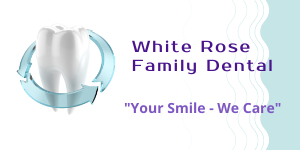Brushing and flossing are essential for maintaining a healthy smile, but what you eat is just as important. Diet plays a key role in keeping teeth strong, preventing cavities, and reducing the risk of gum disease. Unfortunately, many people unknowingly consume foods and drinks that harm their teeth.
Dr. Kapadia of White Rose Family Dental in York, PA, explains that today’s convenience-focused eating habits—fast food, sugary beverages, and processed snacks—are taking a toll on dental health. However, with the right choices, you can protect your smile and support your overall well-being.
How Food Affects Your Teeth
Every time you eat or drink, your mouth experiences a shift in pH levels. Sugary and acidic foods encourage bacterial growth, which leads to plaque buildup and, eventually, cavities. On the other hand, certain foods help strengthen enamel, promote saliva production, and reduce the risk of decay.
“Constant exposure to acids, whether from soda, coffee, or sweet snacks, weakens the tooth’s protective layer,” Dr. Kapadia explains. “That’s why diet is such a critical factor in preventing cavities and gum disease.”
The Worst Foods and Drinks for Oral Health
Sugary and Acidic Beverages
Sipping on sugary drinks throughout the day—whether it’s soda, sports drinks, or flavored coffee—creates a constant acid bath that wears down enamel. Even diet sodas and sugar-free flavored waters can be harmful due to their acidity. If consumed frequently, these beverages can lead to sensitivity, discoloration, and cavities.
It’s best to limit these drinks and opt for water instead, preferably fluoridated water, which helps strengthen enamel and rinse away food particles.
Sticky and Processed Foods
Foods that cling to the teeth, such as candy, dried fruit, chips, and bread, provide a breeding ground for harmful bacteria. Processed carbohydrates break down into sugars, feeding the bacteria that cause plaque buildup and decay.
“If food is sticking to your teeth for long periods, it’s more likely to contribute to cavities,” says Dr. Kapadia. Instead, he recommends rinsing your mouth with water after eating and brushing as soon as possible.
Smoking and Vaping
While not a food, smoking and vaping significantly impact oral health by increasing the risk of gum disease, infections, and even tooth loss. These habits reduce saliva production, making it harder for your mouth to cleanse itself naturally. Additionally, tobacco products stain teeth and contribute to bad breath.
The Best Foods for Healthy Teeth
Dairy Products
Calcium-rich foods like milk, cheese, and yogurt help strengthen enamel and protect against decay. Cheese, in particular, has been shown to neutralize acids in the mouth, making it an excellent snack for oral health.
Crunchy Fruits and Vegetables
Foods like apples, carrots, and celery act as natural toothbrushes, scrubbing away plaque and food particles while stimulating saliva production. Saliva plays a crucial role in neutralizing acids and keeping bacteria in check.
Lean Proteins and Nuts
Protein-rich foods such as chicken, fish, eggs, and almonds provide essential nutrients that support gum health and tissue repair. These foods also contain phosphorus, which works alongside calcium to strengthen teeth.
Eating for Oral Health at Every Age
Children and Teens
For growing teeth, calcium and vitamin D are crucial. Children who consume excessive sugar are at a higher risk for cavities, especially if they don’t practice good brushing habits. Encouraging healthy snacking and limiting sugary treats can set them up for a lifetime of strong teeth.
Adults and Seniors
As people age, they become more susceptible to gum disease and tooth decay. Hydration becomes increasingly important, as dry mouth can lead to an increased risk of cavities. Water, nutrient-rich foods, and regular dental visits help maintain oral health into adulthood and beyond.
Diabetics and Individuals with Medical Conditions
For people with diabetes, high blood sugar levels can weaken gum tissue, making them more prone to infections and tooth loss. Keeping blood sugar stable and sticking to a well-balanced diet can help reduce these risks.
Hydration and Oral Hygiene: The Final Piece of the Puzzle
Even the healthiest diet needs to be paired with good oral hygiene habits. Drinking fluoridated water helps rinse away bacteria and strengthen enamel, while regular brushing and flossing remove plaque buildup. For individuals experiencing dry mouth, using saliva-boosting products can provide added protection.
“Saliva is one of our body’s best defenses against bacteria,” says Dr. Kapadia. “If you have a dry mouth, you’re at a much higher risk for cavities and gum disease.”
Protect Your Smile with Smart Dietary Choices
A tooth-friendly diet, combined with proper oral care, can help you maintain a strong, healthy smile for life. Whether you’re looking for dietary recommendations or need a professional cleaning, White Rose Family Dental in York, PA, is here to help.
Call us today at (717) 822-0272 to schedule your appointment.
By making simple adjustments to your diet and oral care routine, you can protect your teeth and enjoy a healthier, brighter smile for years to come.
